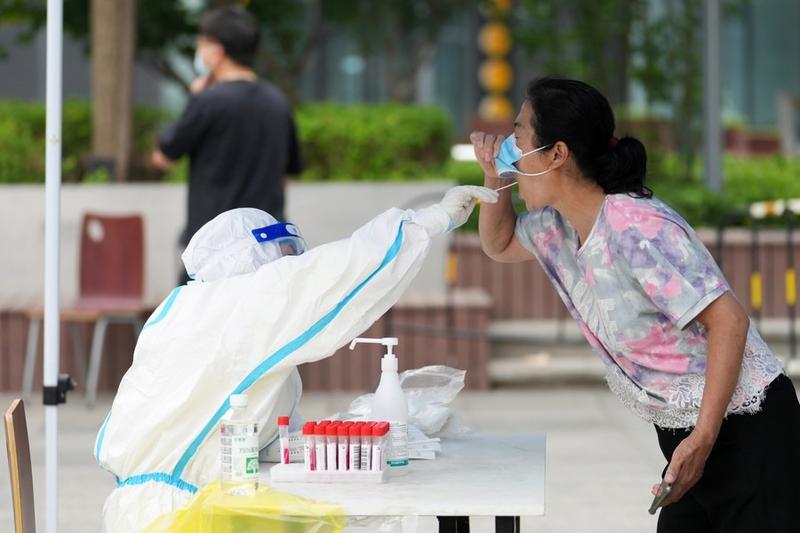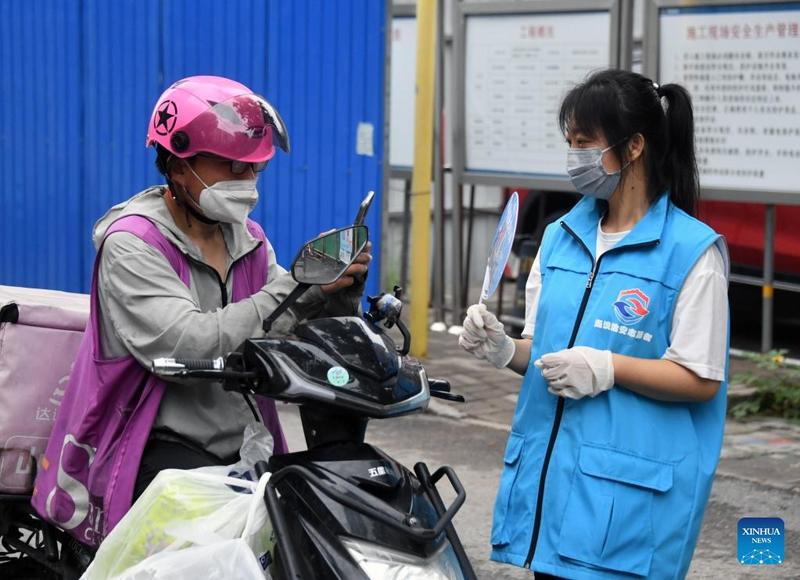 A medical worker takes a swab sample from a resident for nucleic acid testing at Balizhuang Subdistrict in Chaoyang District, Beijing, China, June 11, 2022. (JU HUANZONG / XINHUA)
A medical worker takes a swab sample from a resident for nucleic acid testing at Balizhuang Subdistrict in Chaoyang District, Beijing, China, June 11, 2022. (JU HUANZONG / XINHUA)
BEIJING – Authorities in China's capital Beijing on Monday raced to contain a COVID-19 outbreak traced to a raucous 24-hour bar known for cheap liquor and big crowds, with millions facing mandatory testing and thousands under targeted lockdowns.
The outbreak of nearly 200 cases is linked to the city center Heaven Supermarket Bar, which had just reopened following the easing of curbs there last week.
According to the municipal health commission, Beijing reported 29 confirmed locally transmitted COVID-19 cases and 22 local asymptomatic cases on Sunday. Seventeen patients were discharged from hospitals the same day.
Nationally, health officials on Sunday reported 69 locally-transmitted confirmed COVID-19 cases, including 27 in Inner Mongolia autonomous region. Shanghai, which completed mass testing for most of its 25 million residents at the weekend after lifting its lockdown and many of its curbs at the start of the month, reported 37 cases, including 26 asymptomatic ones, up from 29.
READ MORE: Shanghai begins new round of mass testing, Beijing cases jump
Due to the new outbreak, the Chinese capital will suspend all offline sports events starting from June 13, the Beijing Municipal Bureau of Sports said in a statement on Monday.
We have to test every day now. It's a bit of a hassle, but it's necessary.
Cao, Beijing resident
Dine-in service at Beijing restaurants resumed on June 6 after more than a month in which the city of 22 million people enforced various COVID curbs. Many malls, gyms and other venues were closed, parts of the city's public transport system were suspended, and millions were urged to work from home.
"We have to test every day now. It's a bit of a hassle, but it's necessary," said a 21-year-old resident surnamed Cao, who runs a convenience store in Beijing's largest district Chaoyang, where the bar cluster was discovered. "The virus situation has hurt our business a bit, it's down about 20-30 percent."
Chaoyang kicked off a three-day mass testing campaign among its roughly 3.5 million residents on Monday. About 10,000 close contacts of the bar's patrons have been identified, and their residential buildings put under lockdown, and some planned school reopenings in the district have been postponed.
Queues snaked around some testing sites on Monday for more than 100 meters, according to Reuters' eyewitnesses. Large metal barriers have been installed around several residential compounds, with people in hazmat suits spraying disinfectant nearby.
Last week, as dine-in curbs were lifted, Heaven Supermarket Bar, modeled as a large self-service liquor store with chairs, sofas and tables, reclaimed its popularity among young, noisy crowds starved of socializing and parties during Beijing's COVID restrictions.
 A deliveryman scans a QR code to register his health status at the entrance of a residential area in Zhongguancun of Haidian district, Beijing, June 12, 2022. (PHOTO / XINHUA)
A deliveryman scans a QR code to register his health status at the entrance of a residential area in Zhongguancun of Haidian district, Beijing, June 12, 2022. (PHOTO / XINHUA)
With the almost 200 COVID cases linked to the bar since June 9, authorities described the outbreak as "ferocious" and "explosive". People infected live or work in 14 of the capital's 16 districts, according to the authorities.
The bar cluster was caused by loopholes and complacency in epidemic prevention, the Evening News wrote in a commentary piece on Monday.
ALSO READ: Beijing returning to normalcy as epidemic wanes
If the outbreak grows, "consequences could be serious, and would be such that nobody would want to see," it added.
Heaven Supermarket Bar, and other businesses nearby, including the Paradise Massage & Spa, were under lockdown, with police tape and security staff blocking the entrances. A handful of customers and staff at the parlor would be locked in temporarily for checks, authorities said.
As Beijing authorities wrestled with new COVID cases in April, retail sales in the capital shrank 16 percent year-on-year, while property sales nosedived 25 percent.
Before the bar cases, there had been high hopes for a rebound in June.


